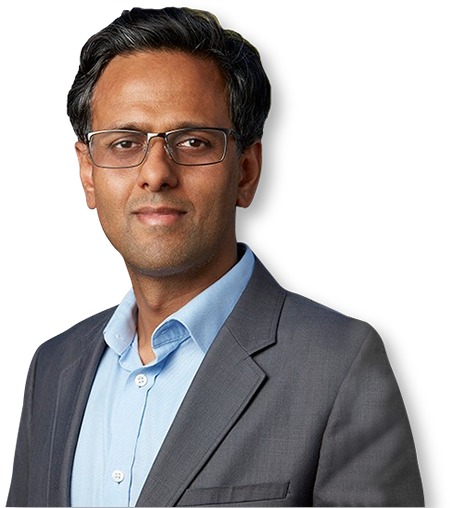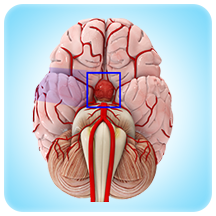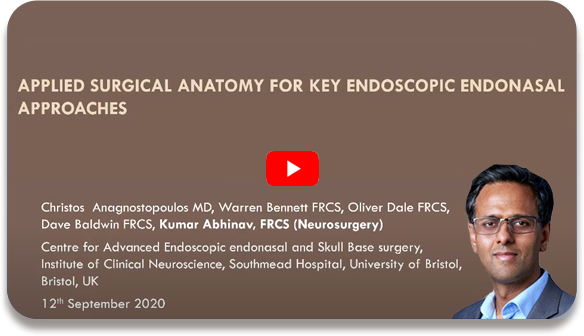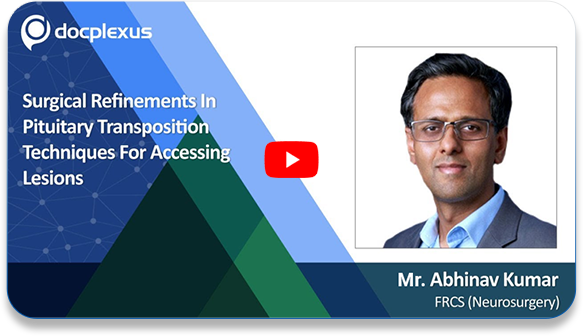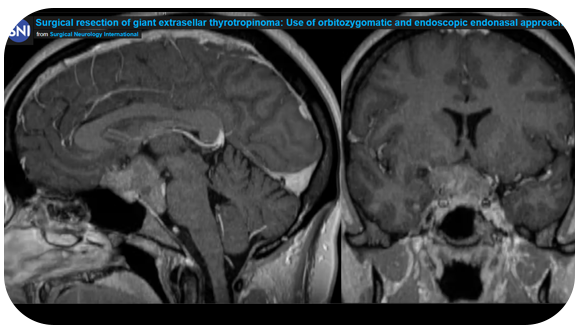- Bristol Spire Hospital
- Bristol Nuffield Hospital
- Southmead Hospital
Mr. Kumar Abhinav is extensively operatively trained at prestigious national and international leading neurosurgical centres in the United States [University of Pittsburgh Medical Center, Pittsburgh and Stanford University, Stanford]. With his expertise in conditions affecting the brain and spinal cord, he focusses on complex brain surgery treating challenging conditions affecting the base of the skull, pituitary gland and blood vessels in the brain. With his expertise in both open surgical techniques and endoscopic endonasal neurosurgery carried out through the nose, he takes pride in choosing the best surgical approach for patient with skull base and other tumours to achieve the best outcomes.
Click on the tabs below to learn about his areas of expertise.
-
Endoscopic endonasal approach (EEA) is a minimally invasive surgical technique that allows your surgeon to treat tissue damage and tumours near
-
A cavernous malformation is a rare type of vascular condition characterised by clusters of tiny blood vessels or capillaries in
-
A schwannoma is the abnormal growth of Schwann cells, which line and insulate nerves. It is usually benign and rarely spreads to affect other
-
An arteriovenous malformation (AVM) is an abnormal tangle of the blood vessels that connect the veins and arteries in your brain.
-
A cavernous malformation is a rare type of vascular condition characterised by clusters of tiny blood vessels or capillaries in
-
A degenerative condition is a continuous deterioration of a tissue or an organ in your body over time.
Mr. Abhinav obtained his medical degree from the Guy's, King's and St Thomas' School of Medicine, King's College London, University of London. He undertook his primary neurosurgical training (brain and spine) in Bristol and Plymouth completing it in July 2017 with the award of Fellowship of the Royal College of Surgeons of England in Neurosurgery in 2016. He is extensively trained in surgical conditions affecting the brain and spinal cord. He subspecialises in skull base (endoscopic endonasal and open), pituitary and cerebrovascular neurosurgery with a focus on complex brain surgery. With his comprehensive training in open and advanced endoscopic endonasal (via nose) surgical techniques, he takes pride in approaching skull base tumours with a 360-degree perspective using the most suitable approach (either via nose or open craniotomy) to enhance patient outcomes with the vast majority now being treated via the endonasal route. His personal goal has been to be provide world class surgical care to his patients. To achieve this, he undertook four years of additional training at leading international neurosurgical centres in the USA. He completed one-year clinical operative fellowship (2017-2018) in open cerebrovascular and skull base neurosurgery under the mentorship of Professor Gary K. Steinberg at the Department of Neurosurgery, Stanford University, Stanford, USA. During this period, he acquired expertise in the management of cerebral aneurysms, arteriovenous malformations, cavernous malformations and cerebrovascular bypass. Following that he completed a further clinical operative fellowship (2018-2019) in skull base and pituitary neurosurgery focussing on advanced open and endoscopic endonasal surgical techniques under the mentorship of Dr Juan C. Fernandez-Miranda, an international leader in this field at the Department of Neurosurgery, Stanford University, Stanford, USA. During this period, he acquired expertise in surgical treatment of difficult pituitary tumours, skull base meningiomas, schwannomas, chordomas and brain tumours including those in deep challenging areas of the brain. To lay down the groundwork for these subspecialist fellowships, during his training he undertook two-year research fellowship in Skull Base Neurosurgery and Surgical Neuroanatomy (2013-2015) towards the award of doctor of medicine as a postdoctoral fellow in the prestigious Department of Neurosurgery, University of Pittsburgh Medical Centre (UPMC). This period under the mentorship of Drs. Juan C Fernandez-Miranda and Robert Friedlander was funded by the prestigious Ellison-Cliffe Travelling fellowship award from the Royal Society of Medicine, London and the University of Pittsburgh Brain Institute.
Skull base surgery is usually performed to remove a tumor or an abnormal growth in the base of the skull. It may be performed as an open surgery or by minimally invasive techniques using an endoscope. During an open skull base surgery, an incision is made in the skull and a portion of the base of the skull is removed to reveal the abnormality. Endoscopic skull base surgery is a minimally invasive technique where a thin tube, with a small light and camera, is introduced through the nose and miniature instruments are used to remove the abnormal growth or tumor.
-
Surgical Anatomy for Endonasal Skull Base Approaches

